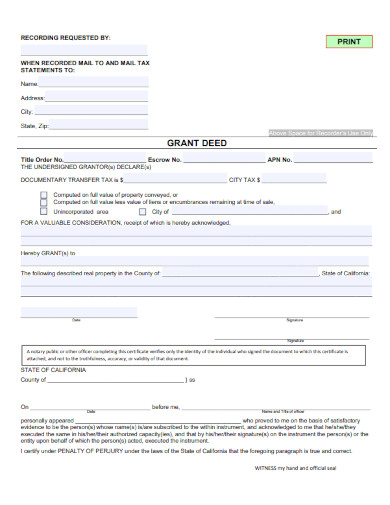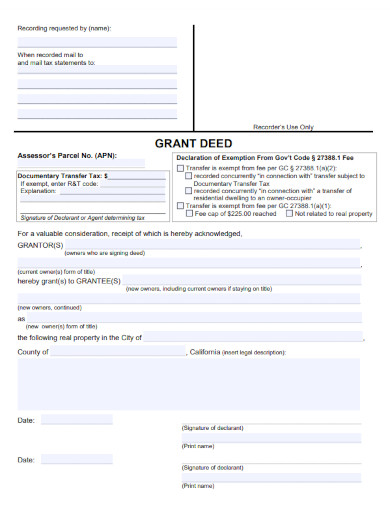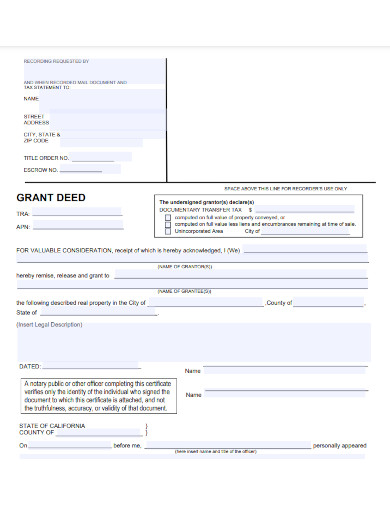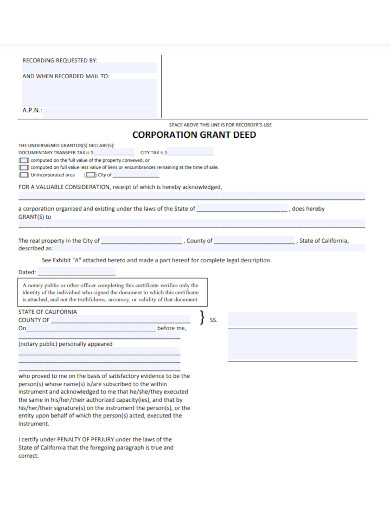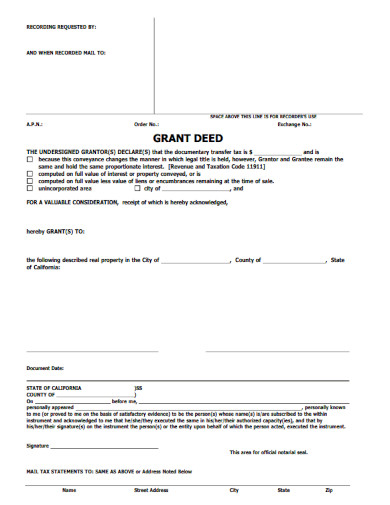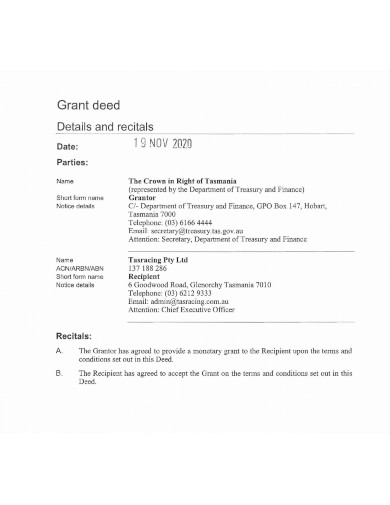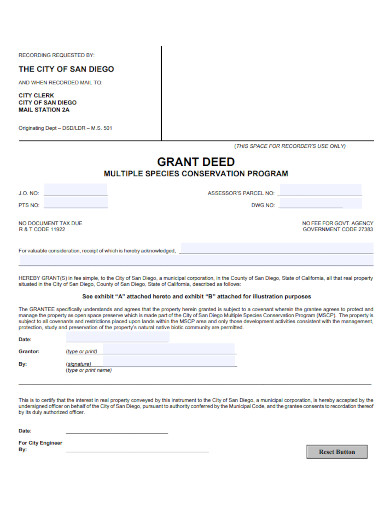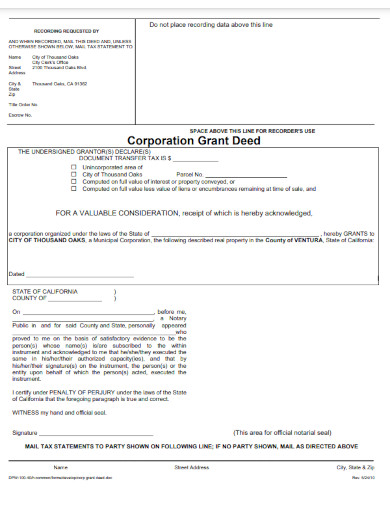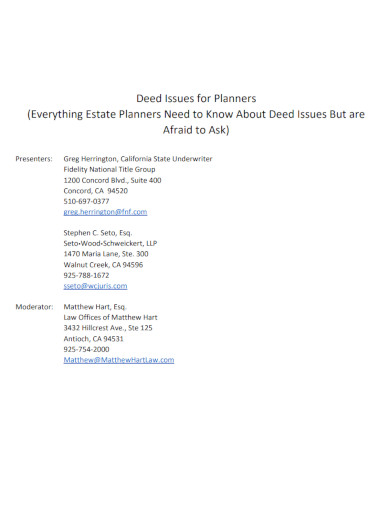A deed is a signed legal instrument that offers the possessor particular rights to an asset if certain circumstances are met. They’re most typically utilized to transfer assets of cars or land between two people. A deed is used to transfer title, which is a legally binding document that proves ownership of a property or asset, from one person to the other. A grant deed is a type of written documentation that a person possesses a property that also gives title assurances to the new owner—that is, assurance that the property title is clear of claims or liens and that the new owner has the option to market or transfer the property to someone else.
10+ Grant Deed Samples
A grant deed is a legal instrument that is used to transfer real estate ownership. It’s a legal document that proves a title hasn’t already been given to someone else. The legal specification of the estate being granted (i.e., lot number, tract number, city, county, and state) is included in a grant deed, as well as the name of the person or entity receiving the property (the grantee). To make the grant deed legally binding, each grantor must approve it.
1. Grant Deed Sample
2. Grant Deed Fillable Form
3. Grant Deed Sample Template
4. Corporation Grant Deed
5. Individual Grant Deed
6. Grant Deed Treasury and Finance
7. Interspousal Grant Deed
8. Sample Grant Deed
9. Corporation Grant Deed Sample
10. Grant Deed Issues for Planners
11. Grant Deed Requirements
A grant deed is a sort of warranty deed that is used in conjunction with the sale of real estate for money or other valuable consideration. There are several significant characteristics of these property deeds.
- A grant deed formally specifies the land, such as its street address and county records information. In some situations, the deed may include the parcel number assigned by the property tax assessor (APN).
- A title business verifies that the title to a building or land lot is free of third-party claims. Grant deeds ensure that a title verification was performed and that no third-party claims were discovered during the seller’s ownership of the property. They do not cover impediments from previous owners’ tenures, unlike common warranty deeds.
- All warranty deeds must be verified by a notary public and entered in the official records of a county recorder or county clerk under most state regulations. A transfer tax may be triggered based on your municipality.
Some localities’ and legal agencies’ websites have grant deed forms and templates available. Before deeding their ownership holdings to someone else, property owners must consult official legal guidance. All ventures, including real estate holdings, carry inherent risks such as asset devaluation, financial losses, and legal consequences. The information in this article is provided solely for educational, informative, and reference purposes. Before taking any legal or financial agreements, visit a licensed real estate or financial adviser.
FAQs
What is an asset class?
Along with stocks, bonds, cash, and alternative investments like private equity and venture capital, real estate, including real property, is frequently referred to as an asset class. Grant deeds are frequently used to transfer property from one owner to another.
What is a commercial real estate?
These criteria are especially important in commercial real estate, which is generally more valuable per square foot than residential real estate. Commercial rental real estate is more strictly regulated than residential real estate, with laws varying by country, state, and even city and county. Zoning requirements, as well as the potential of tenant turnover, can add another layer of complication to commercial real estate transactions.
The scope of the warranties may be inferred by the title of the deed in some regions, eliminating the need to declare them explicitly in the deed. State law determines the particular content, structure, and execution standards for deeds. As a result, you must ensure that you meet the standards of the state in which the site is situated. A grant deed is preferable to a quitclaim deed if you are gaining title, but not as excellent as a general warranty deed. To be as thoroughly protected as possible, title insurance should be obtained regardless of the form of deed utilized.
Related Posts
Sample Business Card Templates
Sample Cashier Job Descriptions
Questionnaire Samples
FREE 10+ Sample HR Resource Templates in PDF
FREE 10+ HR Consulting Business Plan Samples in MS Word | Google Docs | Pages | PDF
FREE 49+ Sample Job Descriptions in PDF | MS Word
FREE 16+ Nonprofit Budget Samples in PDF | MS Word | Excel | Google Docs | Google Sheets | Numbers | Pages
FREE 13+ Academic Calendar Templates in Google Docs | MS Word | Pages | PDF
FREE 10+ How to Create an Executive Summary Samples in Google Docs | MS Word | Pages | PDF
FREE 23+ Sample Event Calendar Templates in PDF | MS Word | Google Docs | Apple Pages
Company Profile Samples
FREE 10+ Leadership Report Samples [ Development, Training, Camp ]
FREE 24+ Sample Payment Schedules in PDF | MS Word
FREE 10+ Return to Work Action Plan Samples in PDF | DOC
Autobiography Samples & Templates

